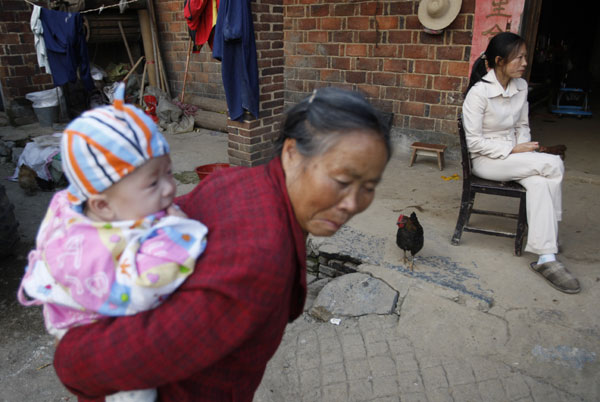'Strangers' return to a frosty village welcome
Yang Deying was dressed in a bright, white leisure suit, a color and style not often seen among the fields and dirt roads of rural China.
 |
|
Yang Deying sits in her courtyard in Nanta village, Hunan province, while her mother-in-law carries one of her twins. Yang, 32, returned to the willage two years ago to get married. |
"I knew I'd come back to the countryside in the end," said the slender 32-year-old, standing at the front door of her family's simple, brick home. "Although, my friends in the city warned me I'd regret it."
After spending more than 13 years as a migrant worker, Yang returned to her roots in the central province of Hunan in 2008 to get married and become a full-time housewife. Readjusting to village life has not been easy, however.
Like millions of other rural women who carved out lives in cities, she has found her attitude toward men, money and motherhood is dramatically different from many of her new neighbors in Nanta village.
"It's hard to explain but I think I've experienced things that those (who stayed in the village) will never understand," said Yang, who has six-month-old twins.
As she talked, a group of housewives holding babies stood nearby, openly making jokes about her. "She's an old lady of the village," one of them called out. "She didn't get married until she was 30. We were all married in our early 20s."
Feeling like the odd one out is common for women attempting to resettle in the countryside, said Meng Xianfan, a retired deputy director of the Chinese Academy of Social Sciences' center for women's studies, who is still involved in its research.
In late 2009, she was part of a team that published the country's first research report into the lives of returned female migrant workers. For two years, they held one-on-one interviews with hundreds of women in rural counties of Anhui, Jiangxi and Henan provinces, as well as in Chongqing municipality and the Ningxia Hui autonomous region.
According to the final report, chief among the respondents' complaints were poor sanitations conditions (some said they have to travel long distances every week just to take a shower) and boredom.
"The experiences migrant women are having in the 'outside world' are upgrading their lifestyles and civilization standards," said Meng.
Her team also discovered a large proportion are frustrated with not being able to use the skills they developed in the cities, either because of a lack of funds or suitable working environments back home.
It is hard for returnees "to find opportunities to make full use of their competencies", reads the final report. "They are longing for the government to provide a suitable platform for them."
 0
0 






